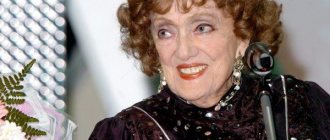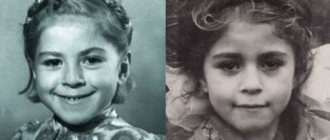Biography
The singer from Georgia became popular during Soviet times and has not lost her fame to this day.
She plays the piano great and teaches. Nani was born into a family where they not only loved music, but had a direct connection to creativity. All relatives were involved in the singer’s work. Some sang beautifully (my aunt and grandmother sang solo parts in the choir), father Georgy Bregvadze was an actor who gave his daughter artistry.
From her mother, Nani learned to act and live with a sense of dignity that belonged to the aristocratic princely family of Mikeladze. The history of the name comes from the father; this name is not Georgian. It is consonant with the name “Nina”; the father came up with the name for his beloved daughter himself.
Interesting facts[ | ]
- The name Nani, which did not exist in Georgia, was invented for the singer by her father. According to Nani Bregvadze herself in the TV show “In Our Time” (broadcast by Channel One (Russia) on June 2, 2014), her name was most likely arbitrarily formed from the name Nina.
- When L. Utesov heard her at the World Festival of Youth and Students in 1957, he said: “This girl, if she continues to sing, will make a good singer.”
- At first Nani did not want to perform the now famous song “Snowfall”. “I don’t know how to sing it,” she told composer A. Ekimyan, who urgently asked the singer to record the song. “Just sing in Bregvadzev’s style,” the author answered her. Soon “Snowfall” became a kind of calling card for the singer.
- After one of the singer’s concerts, I. Kozlovsky, then already an elderly man, went up on stage, knelt down in front of the singer and kissed her hand. N. Bregvadze admitted that, remembering this knightly gesture of the legendary figure, she shudders every time and asks herself with inner trepidation: “God, was it really not a dream?”
Music
From the age of six, the girl sang romances, bringing listeners to tears. Everyone predicted a stellar biography for her. The girl completed her studies at a music school and a music college with honors. The vocalist, at the age of 21, conquered the jury of the World Youth Festival and won the main award. Leonid Utesov was present at the festival, who confirmed the relatives’ confidence that a new star was being born.
The official beginning of her creative biography should be considered her work in the pop orchestra at the Georgian Polytechnic Institute. After 8 years, Nani already had a higher education diploma. At the Tbilisi Conservatory she studied piano. The young singer and pianist was invited to tour to Paris by the Moscow music hall. The girl performed in the Olympia hall, where she was noticed.
Soon she became a member of the vocal and instrumental ensemble "Orera". For fifteen years she was a soloist in this men's group of Bregvadze, VIA, touring, visited 80 countries. In Soviet times, they liked to include the performance of romances and folk songs in concerts, so Nani’s star lit up brighter with each performance. The vocal creativity of VIA "Orera" became better with the arrival of Vakhtang Kikabidze to the team.
Childhood and youth
Nani was born in 1936 on July 21 in the capital of Georgia, Tbilisi. The girl received her short but such a melodious name not by chance. The father of the future singer, Georgy Efimovich, was a professional actor by occupation. Before the birth of his daughter, he starred in the film “Golden Valley” with his wife Olga Alexandrovna. It was a very touching love story between young people Georgy and Nani.
During the filming of the film, several young couples formed in the film group, who had recently gotten married and were just about to add heirs to their families. The women made an agreement that the first girl born would be called Nani, and the first boy would be named George. Nani Bregvadze’s mother was ahead of her friends, fulfilling the terms of the agreement, and thus the girl received her name at birth. After her, a boy was born - Georgy Shengelaya. The third woman could now call her newborn child whatever she wanted; she had a girl, who was given the name Sofiko Chiaureli.
Nani’s mother, Olga Aleksandrovna Mikeladze, came from noble princes who lived in the tiny Western Georgian region of Racha, where grape plantations grew that gave the world the famous Khvanchkara wine. Olga played the piano and sang wonderfully. Despite the fact that she was a talented pianist, she went to study at the university's geological faculty. But after completing three courses, she got married and left her studies for the sake of her family.
Nani’s dad, Georgy Efimovich Bregvadze, studied at a theater studio, and after graduation he acted in films. But then fate turned out that he had to change the type of his activity; he worked in Iran for a long time in a trade mission.
My grandparents on my mother’s side were wealthy nobles Lordkipanidze and Mikeladze, who received an excellent education and had a salon where the most worthy people of that time gathered. Grandfather studied at St. Petersburg University at the Faculty of Law. Nani’s great-grandmother sang professionally, and her aunt, my mother’s sister, was a soloist in the Georgian Folk Choir.
The girl was literally surrounded by an intelligent, creative, musical atmosphere from the cradle. When Nani was only 6 years old, and she had just learned to speak Russian, her love for Russian ancient romance immediately manifested itself. The little girl sang “Don’t leave, my darling,” “Wicket,” “Caravan” and many other songs. As relatives say, the girl not only sang, but with great inspiration; her songs sent goosebumps through the body.
Such an early love of the girl for singing and music was the reason that Nani was sent to study piano at a music school. Everyone in the family wanted her to become a pianist in the future. Therefore, after seven years of study at a music school, study followed at a music technical school for 4 years, and then at a conservatory.
As the singer herself says, she has been singing for as long as she can remember. Although never in my childhood and adolescence did I have the desire to make this my profession in life.
Nani's first listeners were her school friends, whom she entertained with her singing during breaks.
When the girl wanted to try herself on stage, all her relatives were at first against her life path associated with the stage. But the strong and powerful mother made her verdict, which no one contradicted. She said: “Let him sing a little.”
So in 1956, Nani joined the amateur pop orchestra, which was formed at the Georgian Polytechnic Institute.
Solo career, songs
Sooner or later, a star of such magnitude as Nani Bregvadze must burn on its own. The singer began not only to sing, she again revived Russian romance and folk song, supporting all the best traditions in this type of creativity. Released records with recordings of the vocalist's songs sold out very quickly between amateurs and her fans.
The perestroika 90s did not weaken the love for the singer; she began to be invited to numerous competitions and festivals. Thus, the founders emphasized how important the authoritative opinion of Nani Bregvadze is for all speakers.
Ek's daughter
Eka Mamaladze is one of the popular and beloved singers in Georgia. She, like her mother, performs Russian, gypsy romances and Georgian folk songs. At the age of 16, Eka fell in love with a traumatologist who also had feelings for a young girl.
The wedding took place, after a while a son was born, and a year later a second one. Seven years of my daughter's happy marriage ended tragically.
Nani with her daughter Eka and granddaughter Natalya
Her husband Georgiy died suddenly. Eka was left with two small children, whom she raised alone. After some time, she met a new lover and married him.
The marriage produced a daughter, Natasha. But the marital relationship cracked and the couple separated. Today Eka gives many solo concerts in which she performs ancient Georgian romances, and sometimes she performs together with her mother Nani Georgievna Bregvadze.
Vocals and Georgia
The singer did a lot to develop the art of romance and vocal performance in her native country. She provided assistance to talented young Georgian boys and girls. She gave master classes to aspiring vocalists and brought them to the stage. Nani Bregvadze in her youth practically gave her a start in life. She invited famous performers from abroad. For all areas of creative activity in the singer’s native country, she was given a memorable star. The singer, with the rank of professor, headed the department of pop and jazz performance at the Moscow Institute of Music.
Awards and titles[ | ]
- Honored Artist of the Georgian SSR (1968)
- People's Artist of the Georgian SSR (1974)
- People's Artist of the USSR (1983)
- State Prize of Georgia named after. Shota Rustaveli (1998)
- Order of Honor (Georgia) (1997)
- Order of Friendship (Russia) (2008)[5].
- Presidential Order of Radiance (Georgia, 2010)
- Gold medal “For Patronage” (2003)
- Golden Order "Service to Art"
- Titles "Singer of the Century of Georgia"
- Honorary foreign member of the Russian Academy of Arts[6]
- Honorary citizen of Tbilisi (1995)[7].
- Honorary citizen of the city of Benalmadena (Spain, 1996).
Cooperation
The singer has many compositions, but not all of them could be included in the gramophone records, so Nani released an album with such songs based on poems by famous contemporary poets (Akhmadulina and Tsvetaeva).
In the 2000s, she developed close collaboration with Vyacheslav Malezhik, which resulted in a whole cycle of songs. In the vocalist’s repertoire it is difficult to choose one or two compositions that will not leave listeners indifferent. There are many such songs, because the performance of each romance comes from the soul of the performer, and her soul is broad, Georgian.
Notes[ | ]
- Data from the singer's official website
- Nani Bregvadze
- Singer from Georgia Nani Bregvadze canceled her concert in St. Petersburg (unspecified)
. kavkaz-uzel.ru (August 30, 2008). Retrieved February 12, 2016. - Guest Nani Bregvadze. Posner. Issue dated November 21, 2016 // Channel One
- Awarded by Presidential Decree No. 1111 dated July 21, 2008 Archived copy dated July 31, 2008 on the Wayback Machine
- Bregvadze Nani
- ↑ 12
Bregvadze, Nani Georgievna // Who is who in modern culture: In 2 issues. / Ch. ed. S. M. Semenov, author. and comp. N. I. Shadrina, R. V. Pigarev and others - M.: MK-Periodika, 2006-2007. — ISBN 5-93696-007-3, 5-93696-010-2.
Personal life
Not everything worked out for Nani on the personal front. The girl did not choose her first husband; her parents did it for her. Merab Mamaladze wanted to drown out a woman’s desire to sing and be in demand. But the singer could not sit at home. The marriage produced their only daughter, Eka (in Russian, Ekaterina). The husband often came to where his wife was touring. Friends told Merab that he was lucky with his wife, thereby fueling jealousy. On this basis and on the basis of his lack of fulfillment in the profession, the husband often caused scandals at home. Trying to make money, the man signed false documents and ended up in prison.
The legal wife used all her popularity to achieve early release for her husband. She addressed Eduard Shevardnadze. Mamaladze was unable to appreciate everything that his wife did for him. Upon release, the husband, having cheated on his wife, left for another woman. Nani doesn’t hold a grudge against her husband; it’s all in the past. Now the singer is very happy. She is surrounded by her favorite people: her daughter Eka and her children. The singer, who is already 80 years old, has grandchildren (Levan, Georgy, Natalya) and great-grandchildren (Dmitry, Sandro, Nikoloz).
Songs from the repertoire[ | ]
- “Waiting” (words by M. Potskishvili, music by N. Vatsadze)
- “Lost Love” (words by M. Potskhishvili, music by V. Azarashvili)
- “Where have you been, my beloved” (words by I. Chavchavadze, music by G. Chubinishvili)
- “I met you by chance” (words by V. Dunin, music by G. Ponomarenko)
- “Oh, this red rowan” (words by A. Sofronov, music by S. Zaslavsky)
- “Two Rings” (words by A. Bektabekov, music by B. Prozorovsky)
- “I remember the lovely sound of the waltz” (music and lyrics by N. Listov)
- “There are meetings only once in life” (words by P. German, music by B. Fomin)
- “Gas scarf” (words by M. Kozyrev, music by B. Prozorovsky)
- “I Dreamed of a Garden” (music by B. Borisov, lyrics by E. Diterichs)
- “Capricious, stubborn” (ancient romance)
- “Give me, dear friend, your hand for luck” (words and music by K. Lucic)
- “Don’t leave, you are my darling” (old romance)
- “Sing, my guitar” (words by A. Bashkin, music by A. Kruchinin)
- “The viburnum is bitter” (words by N. Kondakova, music by V. Zubkov)
- “Come back” (words by V. Lensky, music by B. Prozorovsky)
- “Snowfall” (words by A. Rustaikis, music by A. Ekimyan)
- “Wicket” (words by A. Budishchev, music by A. Obukhov)
- “Go away, completely go away” (words by V. Vereshchagin, music by F. Drizo)
- “Dry willow” (words by G. Levin, music by G. Sorochan)
- “Charming Eyes” (ancient romance)
- “The Ring of a Guitar” (words and music by N. Zhemchuzhny)
- “Song about Tbilisi” (“Tbiliso”) (words by P. Gruzinsky, music by R. Lagidze)
- “Star of Happiness” (words by D. Gvishiani, music by N. Gabunia)
- “To you, beloved” (words by V. Pshavela, music by G. Chubanishvili)
- “Apple Tree” (words by N. Besedin, music by V. Orlovetsky)
- “I loved you” (words by A. Pushkin, music by B. Sheremetyev)
- “Ivushka” (words by V. Alferov, music by G. Ponomarenko)
- “I loved you so much” (music by B. Prozorovsky)
- “Waltz for you” (words by B. Dubrovin, music by M. Kazhlaev)
- “Romance about romance” (words by B. Akhmadulina, music by A. Petrov)
- “And finally I will say” (words by B. Akhmadulina, music by A. Petrov)
- “The Long Road” (words by K. Podrevsky, music by B. Fomin)
- “Like the last time” (words by V. Lugovoi, music by G. Gladkov)
- “The chrysanthemums have bloomed” (words by V. Shumsky, music by N. Kharito).
- “Caravan” (words by B. Timofeev, music by B. Prozorovsky)
- “Rain again” (words by M. Potskishvili, music by V. Azarashvili)
- “Georgian Sky” (words by P. Gruzinsky, music by G. Tsabadze)
- “But the heart is still full of love” (words by V. Dunin, music by G. Ponomarenko)
- “Seven Flying Horses” (words by G. Pozhenyan, music by V. Saprykin)
- “Dialogue” (words by L. Kuklin, music by G. Sorochan)
- “Farewell Romance” (words and music by E. Bachurin)
- “Voice of the Heart” (words by I. Chavchavadze, music by G. Chubinishvili)
- “Song about the Moon” (words by M. Potskhishvili, music by G. Tsabadze)
- “Mukhambazi” (words by D. Gvishiani, music by G. Tsabadze)
- “When the almond blossoms” (words by P. Gruzinsky, music by B. Kvernadze)
- “The sun will rise” (words by P. Gruzinsky, music by B. Kvernadze)
- “We are both lying” (words by B. Timofeev, music by B. Prozorovsky)
- “Yellow Leaf” (words by A. Sofronov, music by S. Zaslavsky)
- “Snowflake” (words by O. Osenin, music by B. Prozorovsky)
- “Under the caress of a plush blanket” (words by M. Tsvetaeva, music by A. Petrov)
- “Oh, the viburnum is blooming” (words by M. Isakovsky, music by I. Dunaevsky)
- “At the Hour of Sunset” (words by V. Lifshits, music by M. Blanter)
- “And you will love” (words by R. Rozhdestvensky, music by A. Kolts)
- “Don’t leave a woman alone” (words by S. Karatov, music by V. Orlovetsky)
- “My joy lives on” (words by S. Ryskin, music by M. Shishkin)
- “The tomboy’s name is Maria” (words by E. Chernykh, music by T. Markov)
- “Autumn Dew” (words by Yu. Garin, music by I. Yoshka)
- “The Web” (words by K. Kerkorian, music by K. Pevzner)
- “The candle was burning” (words by B. Pasternak, music by I. Pechersky)
- “Coachmen” (words by B. Vakhnyuk, music by G. Movsesyan)
- “Complete Strangers” (words by B. Timofeev and S. Frug, music by B. Prozorovsky)
- “The night is bright” (words by M. Yazykov, music by M. Shishkin)
- “Land of Memories” (words by A. Dmokhovsky, music by V. Azarashvili)
- “Song about the Grapevine” (words by I. Noneshvili, music by R. Lagidze)
- “The Blue-Eyed Witch” (words by L. Chuchubriya, P. Gruzinsky, music by Sh. Milorav, Russian text by B. Bryansky)
- “Love is like a boat” (words by A. Sofronov, music by S. Zaslavsky)
- “Day and Night” (words by I. Reznik, music by O. Tevdoradze)
- “And the song flows” (words by M. Lakhtin, music by V. Kruchinin)
- “I wish you” (words by R. Rozhdestvensky, music by Y. Gulyaev)
- “Echo of Love” (words by R. Rozhdestvensky, music by E. Ptichkin)
- “Levkoi” (words by A. Bashkin, music by B. Prozorovsky)
- “Dark Night” (words by V. Agatov, music by N. Bogoslovsky)
- “Autumn sent me letters” (words by I. I. Shklyarevsky, music by Y. Frenkel)
- “The sun is my friend” (words by M. Potskhishvili, music by V. Azarashvili)
- “Art” (words by M. Potskishvili, music by G. Tsabadze)
- “Salkhino” (words by M. Potskishvili, music by V. Durgvishvili)
- “Song is my joy” (words by P. Gruzinsky, music by V. Azarashvili)
- “Khevsurian Ballad” (words by M. Potskhishvili, music by V. Azarashvili)
- “If you loved me” (words by M. Potskishvili, music by V. Azarashvili)
- “And they didn’t say a single word” (words by M. Potskishvili, music by V. Azarashvili)
- “Solar Drops” (words by A. Dmokhovsky, music by T. Megwinetukhutsessi)
- “Our love is over” (words by A. Borley, music by M. Zhur)
- “Little Ballad” (words by M. Potskhishvili, music by G. Tsabadze, Russian text by A. Dmokhovsky)
- “Let me dream” (words by M. Panzeri, music by D. Nis)
- “Where are you, my dear” (words by N. Areshidze, music by G. Tsabadze, Russian text by B. Bryansky)
- “Primo - secondo” (folk words, music by G. Mouzakis)
- “You are my hope” (words by G. Tabidze, music by V. Azarashvili)
- “Tandem” (words by Messen, music by L. Reed)
- “I Sing Again” (music by D. Botari, arrangement by V. Semenov, lyrics by an unknown author)
- “But I still love you” (ancient romance, words by N. Lensky)
- “Sing, ring, my guitar!” (“Honey-Amethyst”) (music by V. Kruchinin, lyrics by K. Podrevsky)
- “Twilight” (words by M. Potskishvili, music by N. Vatsadze)
- “My Youth” (words by B. Purgalin, music by N. Gabunia)
- “What are you whispering about, trees?” (words by V. Lugovoi, music by G. Gladkov)
- “Child and Rose” (music and lyrics by M. Kuzmin)
- “What made you sad” (words by I. Selvinsky, music by M. Blanter)
- “Confession” (words by N. Shemyatenkova, music by V. Mikhailov)
- “Green Years” (words by S. Kovalev)
- “This flower is not bright” (words by V. Mass, music by M. Blanter)
- “At the Window” (words by V. Sergeeva, music by I. Schwartz)
- “Conversation with you” (words by A. Eshpai-son, music by A. Eshpai)
- “Memories” (words by A. Eshpai-son, music by A. Eshpai)
- “A Month in the Blue Sky” (words by V. Mass, music by M. Blanter)
- “Horses-Beasts” (words by I. Selvinsky, music by M. Blanter)
- “Belovezhskaya Pushcha” (words by N. Dobronravov, music by A. Pakhmutova)
- "Alone with everyone"
- "My month has come"
- "Prayer"
- "Your eyes"
- "Magic Words"
- "Belated Recognition"
- "Love" (Italian song)
Childhood
Nani was born on July 21, 1938 in Tbilisi into a creative family. Her father Georgy Efremovich acted in films and played in the theater, her mother played the piano beautifully, and her parents paid great attention to the creative education of their daughter. The girl began to sing almost as soon as she learned to speak. Already at the age of six, Nani beautifully performed the romances “Kalitka” and “Don’t leave, my darling” with a guitar.
Nani Bregvadze as a child with her parents
After graduating from music school, the girl decided to continue improving her piano skills and entered a local specialized college. For several years she dreamed of becoming a popular pianist, although she was also interested in singing. Nani’s mother managed to convince her of her choice of specialty, drawing attention to her daughter’s vocal talent.
Music career
In 1966, Nani met Vakhtang Kikabidze, who also joined the Orera ensemble. He not only sang, but played percussion instruments there. Joint tours brought the young artists together, and they soon became best friends. With Vakhtang and Nani, the team released several records, which almost immediately became classics of Soviet pop music.
Nani Bregvadze, Vakhtang Kikabidze and the Orera ensemble
In 1968, Nani received the title of Honored Artist of the Georgian SSR. In 1970, together with Kikabidze, she took part in the filming of the musical “Orera, Full Throttle Ahead,” dedicated to the ensemble’s trip to Australia. In 1974 she became the People's Artist of Georgia.
In 1980, the singer decided to go on a solo voyage. With her sensual and tender songs, she returned the love of many Soviet listeners to Russian and gypsy romances. Her fans especially loved such songs as “Lost Love” and “I Remember the Waltz Sound.” But Nani’s calling card was the lyrical song about women’s fate “Snowfall,” performed by her for the first time in 1981. Two years later, the Georgian singer became People's Artist of the USSR.
Nani Bregvadze - People's Artist of the USSR
In the 90s, Nani continued to delight listeners with her soulful performances, releasing albums such as “Romance, Romance” (1995) and “Concert in New York” (1997). In 1997, Bregvadze founded, in which she began supporting young Georgian musicians. In addition, she was an active participant in the public organizations “Women for Peace” and “Soviet Woman”.
Since 2002, Nani has been engaged in teaching activities, heading the department of pop vocals at the Institute of Music of Moscow State University of Culture and Culture. In 2005, the singer recorded a new disc with previously unreleased songs based on poems by Bella Akhmadulina and Marina Tsvetaeva. Over time, Bregvadze began to perform less and more time to devote to her family and well-deserved rest.
Personal life of Nani Bregvadze
The singer's first and only husband was Merab Mamaladze. Due to his wife’s frequent tours, her husband regularly staged scenes of jealousy for her.
Nani Bregvadze and Merab Mamaladze
In 1960, the couple had a wonderful daughter, Eka (Ekaterina), who later also became a popular singer in Georgia.
Nani’s marriage to Merab did not work out, and after long separations and litigation they divorced. The singer became a grandmother three times and is now raising her great-grandchildren Dmitry and Alexander.
Nani Bregvadze with grandchildren (1989)
The eldest grandson, Levan, is a dentist by training, now works on television, his brother, Georgiy, is an architect. Granddaughter Natalya is following in her grandmother’s footsteps and is building a career as a vocalist.









